Topics - e-Bulletin
University of Electro-Communications publishes March 2015 issue of e-Bulletin: Fuel cells in the spotlight
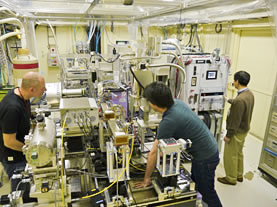
The March 2015 issue of the University of Electro-Communications e-Bulletin includes research highlights on fuel cells; cybersecurity; brain science and mechanisms of long-term memory; biphotons for future quantum communication; virtual robotization for human limbs; high tech hydroponics and water agriculture; and 'innovative technologies' to assist the elderly with cognitive and physical difficulties.
Feature article
Fuel cells in the spotlight
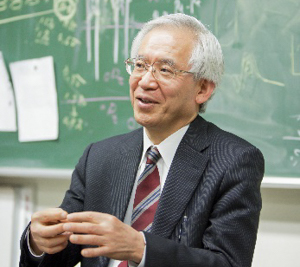
http://www.ru.uec.ac.jp/e-bulletin/feature/2015/fuel-cells-in-the-spotlight.html
In-situ, dynamic X-ray absorption fine structure (XAFS) spectroscopy to demystify the behavior of catalysts in fuel cells
Professor Yasuhiro Iwasawa, head, Innovation Research Center for Fuel Cells
Research Highlights
Quantum optics: Understanding spectral properties of broadband biphotons
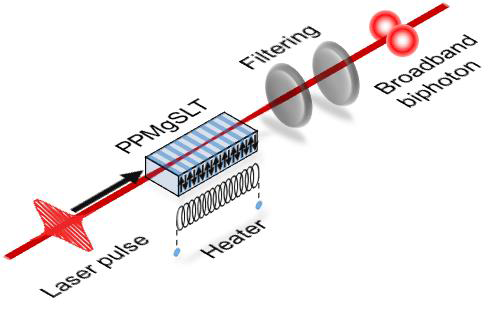
Advances in quantum optical technologies require scientists to control and exploit the properties of so-called biphotons. Biphotons occur when two photons become 'quantum-entangled' - spatially separate entities whose individual quantum states must be described with reference to each other. Biphotons of different wavelenths can be created, with broadband biphotons particularly useful for quantum optics.
Motor memory: the long and short of it
http://www.ru.uec.ac.jp/e-bulletin/research-highlights/2015/the-long-and-short-of-it.html
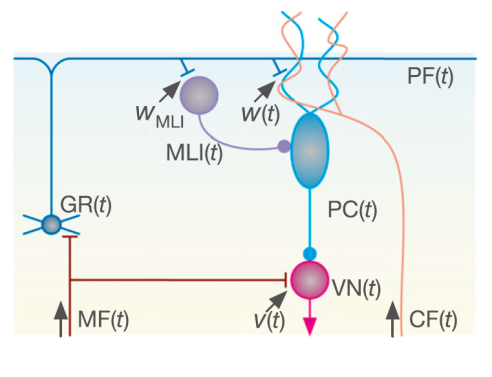
Recent studies of long-term motor memory have pointed out the involvement of synaptic plasticity at multiple sites in the cerebellum, but the physiological mechanism remains unclear. Now results from a collaboration of researchers at the University of Electro-Communications and the RIKEN Brain Science Institute in Japan, and the University of California, San Diego, in the US, successfully integrated the multiple plasticity mechanisms to explain the formation of long-term motor memory using simulations based on a mathematical model.
Robotics: Virtual robotization for human limbs
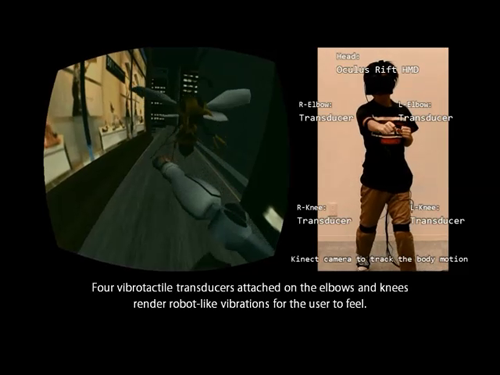
Recent advances in computer gaming technology allow for an increasingly immersive gaming experience. Gesture input devices, for example, synchronise a player's actions with the character on the screen. Entertainment systems now use special haptic displays - these are attached to the player's body to provide so-called 'vibrotactile feedback', synthesizing the feeling of being attacked during combat games, for example.
News and Events
UEC Optical Science group featured in APS TV video
http://www.ru.uec.ac.jp/e-bulletin/news/2015/uec-optical-science-group-featured-in-aps-tv-video.html
Topics
Brain Science Inspired Life Support Research Center, UEC
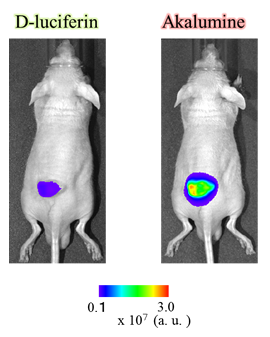
Brain Science Inspired Life Support Research Center was established in May 2013 as an interdisciplinary research institute with the mission of helping people to live peacefully in an aged society. "The BLSC was set up based on UEC's philosophy of 'comprehensive communication sciences', says Shigeru Tanaka, Specially Appointed Professor Office of Comprehensive Communication Sciences Initiatives. "Our Center has specialists from a wide range research areas including brain science, informatics, robotics, and optics. Research staff include Yoichi Miyawaki, a tenure track associate professor who is conducting experiments on sensory information processing of the brain using functional MRI and EEG measurement systems."
Developing strategies to counter cyber-attacks on industrial infrastructure
Cyber-attacks, computer viruses, and hacking are terms synonymous with unapproved access of computer systems managed by banks and national security organizations. However, such 'cyberattacks' have recently been directed at factories and manufacturing plants, power stations, and even water purification facilities.
High tech hydroponics: Fusing information technology with fifteen century approach to agriculture
Professor Akashi Satoh, Department of Communication Engineering and Informatics, Graduate School of Informatics and Engineering, University of Electro-Communications, Tokyo.
Letter From Alumni
http://www.ru.uec.ac.jp/e-bulletin/topics/2015/letter-from-alumni-5.html
Shakeel Ahmed, Assistant Professor at Department of Electrical Engineering, Pakistan Institute of Engineering and Applied Sciences (PIEAS), Islamabad, Pakistan.
Further information
International Public Relations
The University of Electro-Communications
1-5-1 Chofugaoka, Chofu, Tokyo 182-8585
- E-mail :

- Website :
- http://www.uec.ac.jp/eng/
About The University of Electro-Communications
The University of Electro-Communications (UEC) in Tokyo is a small, luminous university at the forefront of applied sciences, engineering, and technology research. Its roots go back to the Technical Institute for Wireless Commutations, which was established in 1918 by the Wireless Association to train so-called wireless engineers in maritime communications in response to the Titanic disaster in 1912. In 1949, the UEC was established as a national university by the Japanese Ministry of Education, and moved in 1957 from Meguro to its current Chofu campus Tokyo.
With approximately 4,000 students and 350 faculty, UEC is regarded as a small university, but with particular expertise in wireless communications, laser science, robotics, informatics, and material science, to name just a few areas of research.
The UEC was selected for the Ministry of Education, Culture, Sports, Science and Technology (MEXT) Program for Promoting the Enhancement of Research Universities as a result of its strengths in three main areas: optics and photonics research, where we are number one for the number of joint publications with foreign researchers; wireless communications, which reflects our roots; and materials-based research, particularly on fuel cells.
- Website :
- http://www.uec.ac.jp/eng/

